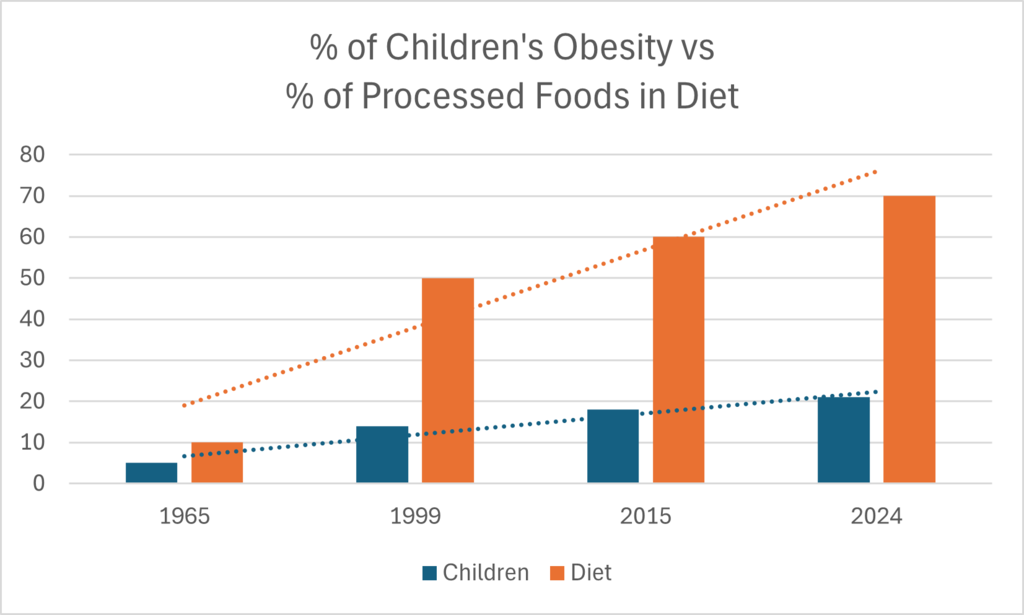You might have read on the news lately that weight control drugs like Ozempic are now approved for kids 12 years and up. Sadly, the under-12 group is still waiting to get approval. Say WHAT?
I recently stumbled across a bunch of US-based statistics. Neither Canadians nor Europeans should feel smug, though, because Canada is in lockstep with these statistics, and Europeans lag them only slightly. Being a bit of a visual nerd, I thought a graph might make more sense.

The bluish column represents the statistics for children’s obesity, and the bluish line represents the trend line. The orangish column represents the amount of processed foods in a regular diet expressed as a %. The orangish line is the corresponding trend line.
In summary,
Before 1970, childhood obesity rates were below 5%. Today, they’re closer to 21% In regular pre-1970 diets, processed food was less than 10% of the total caloric intake. These days, it’s closer to 70%.
It’s important to realize that these numbers are only for obese kids and do NOT include the number of simply overweight kids. Those kids, the ones who are ‘on the pudgy side,’ comprise another 16%.
We’ve all noticed that kids seem much bigger these days, right? Well, statistics show that nearly 50% of all kids are indeed much bigger than they need to be. Naturally, we blame lack of exercise, too much screen time, and a whole host of other reasons.
I see something slightly different.
Women began entering the workforce in the ’60s. They were expected to work as mini males: keep quiet, head down, take orders from the higher-ups, naturally put up with sexist behaviours, take home 50 cents on the dollar, and keep a smile on their faces at all times.
The extra money in the household coffers, the knowledge of being more than a housewife, and the personal satisfaction of helping, enabling, inspiring, and putting their education to good use were indeed intoxicating. Because all of us need a solid purpose in life, don’t we?
Innovative manufacturers took note and began to fill a gap known as convenience. Convenience meant women could spend far less time in the kitchen and more quality time with their families. Thus, processed foods started their upward trajectory.
Now, I honestly do not believe that anyone ever thought adding convenience to the food agenda would result in obesity. Nor do I honestly believe anyone worried that having women enter the workforce in greater numbers would bring about the downfall of nutritious eating.
Yet here we are nearly fifty years later, and Big Pharma is jumping in to save the day. And like it always does, it solves for the outcome. Nobody and nothing is addressing the underlying condition.
My theory is that
Humans were built for happiness, not success. For living healthy lifestyles, not for popping pills or taking legal injections. For giving and receiving in relationships; not for competing and striving to always be one better.
The corporate machine is built for ‘success,’ which in some form or another means growth. Humans were built for caring—for each other, for the planet, and for the future. Except the corporate machine has ALWAYS devalued caring and caregiving.
Several corporations reacted to the original gap for convenience. Then, they took it to the extreme, ultimately damaging the humans it was trying to help. Another corporate machine saw the new needs caused by the first machine and has just been approved to save the teens. And yet, in the not-too-distant future, I’ll wager anything that another corporate machine will rescue the side effects caused by the second machine.
It’s almost like our lives are literally falling apart, and because we feel helpless to stop it, we put our faith in Big Pharma, the government and anything else we think can save us. Are we so far along that we cannot save and care for ourselves?
In 1954, approximately 45% of all North American adults smoked. Banning public smoking did not occur until the late 90s or early 20s. These days, six generations from that peak, around 10 to 12% of the population STILL smokes.
As a former smoker, I know how easy it was to pick up the habit and how bloody hard it was to stop it. I am also very much aware of both the attitudes toward and the health issues against smokers.
We, humans, seem blissfully unaware
That our actions have, yes, indeed, caused all these unintended consequences. More than 50% of our population is overweight or obese because processed foods are so damn convenient, addictive and relatively inexpensive. Worse, the concept of saved quality time to be reinvested into family time has all but disappeared as both sexes grapple with the demands placed upon them by their employers or businesses, their kids, and their extended families, not to mention the responsibility of keeping tummies fed and a roof over everybody.
We have sacrificed ourselves and our families at the altar of success in the misguided thinking that more is better. We have created another colossal healthcare crisis of today and tomorrow. In not even three whole generations. Obesity.
And, unlike smoking, it won’t lessen.
We have replaced smoking with eating processed foods. No actions are being taken against processed foods like there were against smoking in the 1990s and 20s. Few of us link processed foods with health risks. And one person eating their own plate has no impact on the air that another breathes.
Why don’t we fine the manufacturing companies for creating poison that causes our children to gain weight? Why not use some of that quality time that convenience gave us and put it to use for society? We all know our healthcare systems are breaking, if not broken. It’s up to us. It starts with us. How can WE care more?
